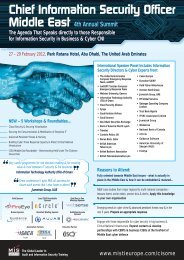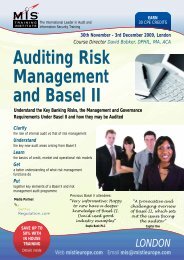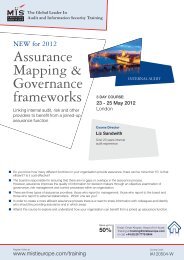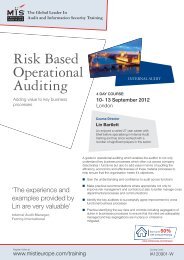Obtaining German Works Council Approval to Collect Employee E ...
Obtaining German Works Council Approval to Collect Employee E ...
Obtaining German Works Council Approval to Collect Employee E ...
You also want an ePaper? Increase the reach of your titles
YUMPU automatically turns print PDFs into web optimized ePapers that Google loves.
GUIDANCE SOFTWARE | WHITEPAPER<br />
OBTAINING GERMAN WORKS COUNCIL APPROVAL<br />
<strong>Obtaining</strong> <strong>German</strong> <strong>Works</strong> <strong>Council</strong><br />
<strong>Approval</strong> <strong>to</strong> <strong>Collect</strong> <strong>Employee</strong> E-mail<br />
and Electronic Documents<br />
Patrick J. Burke, Esq.
I. Executive Summary<br />
Companies that seek <strong>to</strong> collect <strong>German</strong> employee E-mails and electronic documents all confront the<br />
same hurdle: obtaining permission from their company’s works council. <strong>German</strong>y’s works councils<br />
have earned a reputation as fierce protec<strong>to</strong>rs of employee privacy rights, often rejecting corporate<br />
efforts <strong>to</strong> search through employee data. Their opposition invokes the rights and protections afforded<br />
<strong>German</strong> employees pursuant <strong>to</strong> the 1995 E.U. Data Protection Directive as well as <strong>German</strong> federal<br />
and state data protection laws.<br />
This white paper will address several questions that arise in dealing with <strong>German</strong> works councils,<br />
such as<br />
• What is a works council and how do they function<br />
• What is the <strong>German</strong> data protection regime upon which the works councils can base their<br />
objections<br />
• What steps can a company take <strong>to</strong> maximise the probability that its data collection methodology<br />
will be approved by its works council<br />
The suggested approaches <strong>to</strong> the works councils are based on interviews with two Guidance Software<br />
cus<strong>to</strong>mers who successfully obtained works council approval at their companies for au<strong>to</strong>mated<br />
collection of employee E-mail and electronic documents using EnCase ® Enterprise and Guidance’s<br />
own experience. Each of these major non-<strong>German</strong> corporations – one an au<strong>to</strong> maker and the other a<br />
manufacturer of computer components – showcased the functionality of EnCase Enterprise as an<br />
essential part of their successful applications.<br />
II. The <strong>Works</strong> <strong>Council</strong><br />
<strong>Works</strong> councils have been an integral part of <strong>German</strong> business and industry since the early 20 th<br />
century. The first works council provision was enacted following World War I and has existed in<br />
various forms ever since. The existing law is enshrined in the <strong>Works</strong> Constitution Act of 1972<br />
(Betriebsverfassungsgesetz) and applies <strong>to</strong> private enterprises with more than five permanent<br />
employees of voting age. 1<br />
<strong>Works</strong> councils are established through democratic processes. Candidates for works councils must<br />
secure a certain amount of signatures from their fellow employees <strong>to</strong> be eligible for election. 2 Trade<br />
unions may also nominate candidates for election, but cannot compel their members <strong>to</strong> vote a specific<br />
way. 3 <strong>Works</strong> council member are elected directly by company employees through a secret ballot,<br />
though employees are not required <strong>to</strong> vote, 4 and generally serve for four years. 5 The size of a<br />
works council depends on the number of employees within a company and the <strong>Works</strong> Constitution<br />
6<br />
Act also requires works councils <strong>to</strong> proportionately represent certain types of employees.<br />
Under the <strong>Works</strong> Constitution Act, works councils have the right <strong>to</strong> co-determination in matters<br />
affecting company structure, personnel decisions, and policies regulating workplace and individual<br />
conduct within the company. 7 The rights of a works council can be categorised as follows:<br />
• Information: The works council has the right <strong>to</strong> information regarding the implementation or<br />
change of practices or policies at the company. If necessary, the employer must provide<br />
documentation <strong>to</strong> that effect.<br />
©2008 Guidance Software. All Rights Reserved.
• Consultation and Cooperation: The works council has the right <strong>to</strong> consult and cooperate with<br />
management <strong>to</strong> jointly discuss and develop the <strong>to</strong>pic at issue.<br />
• Ve<strong>to</strong> Right: A works council has the right <strong>to</strong> block certain management decisions.<br />
The employer is required <strong>to</strong> keep the works council fully informed in matters relating <strong>to</strong> operations<br />
and personnel planning so that the council can participate in drafting company policy. 8 The purpose<br />
of this is <strong>to</strong> allow the works council <strong>to</strong> cooperate with management <strong>to</strong> avoid potential disputes and<br />
raise relevant concerns or other suggestions.<br />
The works council resolutions require a quorum of fifty percent and resolutions are adopted by simple<br />
majority unless otherwise required by law. 9 <strong>Works</strong> councils and management may, formally or<br />
informally, enter in<strong>to</strong> valid and binding agreements; 10 formal agreements are immediately binding on<br />
employer and employees and informal agreements generally require additional steps, such as the<br />
amendment of an employee contract. The works council may only enter in<strong>to</strong> works bargaining<br />
agreements in those areas of business operation where the <strong>Works</strong> Constitution Act confers rights of<br />
participation on it. <strong>Collect</strong>ive bargaining agreements between employer associations and trade unions<br />
have absolute priority over works bargaining agreements, even if the latter are more favorable <strong>to</strong> the<br />
work force. 11<br />
In the event that disputes between works councils and management cannot be resolved amicably, the<br />
parties may be assisted by the conciliation board, a body with arbitration and mediation duties. 12<br />
Assuming that both parties agree <strong>to</strong> be bound by its decision beforehand, the conciliation board’s ruling<br />
is final and binding and is appealable only on the grounds that the board has violated general principles<br />
of law. 13<br />
III. <strong>German</strong> Data Protection<br />
When works councils assert their right <strong>to</strong> approve or disapprove employee data collection<br />
methodologies, they are in part invoking their rights pursuant <strong>to</strong> European Union law, <strong>German</strong> federal<br />
law, and the data protection laws of their home states. The EU Data Protection Directive authorises<br />
the processing of employee data as long as it is necessary <strong>to</strong> protect the legitimate interest of another<br />
party and as long as the employee’s interests and fundamental freedoms are not overridden. 14 Each<br />
member state has enacted legislation that effectuates the general tenets of the EU Directive.<br />
<strong>German</strong>y’s Federal Data Protection Act (Bundesdatenschutzgesetz) regulates the collection of<br />
personal data as well as the s<strong>to</strong>rage, alteration, transfer, blocking, deletion and use of such data. 15<br />
It also allows for collection of employee data under certain circumstances and calls for a balance<br />
between the legitimate business purposes of the company and the legitimate privacy interests of<br />
affected employees. 16 In some situations, employee notification and even consent are required for<br />
collection of personal data. 17 The Federal Data Protection Act regulates compliance with the law<br />
through company self-moni<strong>to</strong>ring and external government oversight. It also differentiates between<br />
criminal and administrative violations of the law as well penalties for such infractions.<br />
Data protection is also regulated on the state level. The <strong>German</strong> states all maintain data protection<br />
laws that mirror the Federal Data Protection Act. 18 Each state legislative body appoints its own State<br />
Commissioner for Data Protection. The State Commissioner operates independently and is<br />
supervised by the President of the state legislature. 19 The State Commissioner also oversees private<br />
organisations within its jurisdiction <strong>to</strong> ensure compliance with the state data protection law. 20 Like<br />
©2008 Guidance Software. All Rights Reserved.
the Federal Act, the state data protection laws provide for notification and the obtaining of consent<br />
before processing of personal data can take place.<br />
Compliance with the <strong>German</strong> data protection regime is achieved through self-moni<strong>to</strong>ring within the<br />
company and external oversight by federal and state officials. Federal and state data protection<br />
commissioners are responsible for ensuring that companies comply with the law and are empowered<br />
<strong>to</strong> investigate violations. These commissioners may also perform audits <strong>to</strong> ensure that a company’s<br />
organisational and technological safeguards sufficiently comply with the applicable data protection<br />
law. 21<br />
Companies are also required <strong>to</strong> self-regulate <strong>to</strong> ensure their own internal compliance; each company<br />
is required <strong>to</strong> appoint a Data Protection Officer <strong>to</strong> moni<strong>to</strong>r its practices. The Data Protection Officer<br />
reports directly <strong>to</strong> corporate management and is responsible for ensuring compliance with applicable<br />
data protection laws and representing the company <strong>to</strong> the external government agencies that enforce<br />
the BDSG at the state and federal levels. 22 The Data Protection Officer is also tasked with ensuring<br />
that deficiencies in a company’s data protection regime are rectified. <strong>Employee</strong>s whose data is<br />
targeted may approach the data protection officer any time they have concerns. 23<br />
IV. Securing <strong>Works</strong> <strong>Council</strong> <strong>Approval</strong> <strong>to</strong> <strong>Collect</strong> <strong>Employee</strong> Data<br />
<strong>Works</strong> councils are different in every company, and each company has an individual relationship with<br />
their works councils that will affect their presentation on this <strong>to</strong>pic. We interviewed two major<br />
companies with substantial facilities in <strong>German</strong>y (although based outside of <strong>German</strong>y) that have<br />
recently received permission from their works councils for collection of employee e-mail and<br />
electronic documents. The two companies – one au<strong>to</strong>motive and the other a manufacturer of<br />
computer components – use the EnCase Enterprise technology for collection and both emphasised its<br />
use in their applications <strong>to</strong> their works councils.<br />
Based on the experience of those two companies, as well as suggestions from other major companies<br />
with operations in <strong>German</strong>y, we offer the following suggestions for successful works council<br />
applications:<br />
• Get on the works council agenda as early as possible. Usually this is handled through the<br />
company’s HR department, which generally interfaces with the works council. In the case of<br />
the au<strong>to</strong> maker, it <strong>to</strong>ok months just <strong>to</strong> get on<strong>to</strong> the agenda for a monthly meeting.<br />
• Make your presentation in <strong>German</strong>. This may sound obvious, but it’s worth noting that<br />
even though the managers who run your data collection operations are English speakers, they<br />
should employ a <strong>German</strong>-speaking manager <strong>to</strong> make the presentation and field questions (the<br />
presentation materials used should be in <strong>German</strong> as well). If there is an non-<strong>German</strong><br />
speaking manager with significant collection responsibility, they should also attend, both out<br />
of respect and <strong>to</strong> be available for <strong>to</strong>ugh questions.<br />
• Emphasise that EnCase Enterprise can enable you <strong>to</strong> avoid collecting employee<br />
personal E-mail or documents. With EnCase Enterprise, your collections will cull through<br />
the data and preserve only those E-mails and electronic documents that meet precise search<br />
criteria, including keywords and file types. Other documents that do not meet the search<br />
criteria – including private personal data – will be left behind.<br />
• Assure that collections will be done “in-country”. Some works councils are reassured<br />
when <strong>to</strong>ld that all collections will be done from within <strong>German</strong>y, rather than operated from a<br />
location in another European member state or else outside Europe. EnCase Enterprise<br />
©2008 Guidance Software. All Rights Reserved.
technology allows for an “examiner” (a lap<strong>to</strong>p or workstation from which the EnCase search<br />
is operated) <strong>to</strong> be placed inside <strong>German</strong>y, even if that is not its usual location.<br />
• Discuss how EnCase Enterprise can be configured <strong>to</strong> prevent employee data from being<br />
transferred outside Europe. EU data protection laws permit transfers <strong>to</strong> other European<br />
jurisdictions, but prevent most transfers outside Europe. EnCase Enterprise can be<br />
configured <strong>to</strong> prevent searches of European employee data from outside of Europe, and<br />
prevents the transfer of data collected <strong>to</strong> locations outside Europe.<br />
• Emphasise that existing investigative policies already approved by the works council<br />
will remain in place. For example, HR policies relating <strong>to</strong> the investigation of potential<br />
employee wrongdoing had long ago been approved by the works council and will not be<br />
affected by the use of EnCase Enterprise technology. That data would go directly <strong>to</strong> the<br />
company’s HR team and would be handled the same as before.<br />
• Permit employees <strong>to</strong> create a “personal folder.” If employees create a folder in their<br />
computer file structure with an agreed-upon folder name in which they can place all of their<br />
personal data, EnCase Enterprise’s search criteria can be configured <strong>to</strong> leave that folder<br />
un<strong>to</strong>uched, so that none of that data will be collected.<br />
• Ability <strong>to</strong> restrict searches by file type. <strong>Employee</strong>s can be sensitive about certain types of<br />
files that may not be of interest <strong>to</strong> the company – personal pho<strong>to</strong>graphs, for instance. With<br />
EnCase Enterprise, these file types can be excluded.<br />
V. Conclusion<br />
Companies seeking approval from works councils, particularly companies based outside of <strong>German</strong>y,<br />
must approach their works councils with sensitivity <strong>to</strong>ward the interest in the protection of the<br />
employee’s personal data. This sensitivity is often not enough <strong>to</strong> obtain the works council’s blessing<br />
for a collection methodology; the concerns are that the collection methodology may expose personal<br />
employee information and the employee data may be accessed from outside <strong>German</strong>y. To gain<br />
approval, the collection methodology itself must reflect proactive strategies – including procedures<br />
and technology – <strong>to</strong> guarantee that employees need not be concerned that their private e-mail and<br />
electronic documents will be collected along with those the company requires for legal purposes.<br />
As the au<strong>to</strong>motive and computer component companies learned, the use of EnCase Enterprise<br />
technology can serve as an invaluable part of that guarantee of compliance with data protection laws.<br />
©2008 Guidance Software. All Rights Reserved.
APPENDIX I: Key Players<br />
Federal Data Protection Commissioner:<br />
Data Protection Commissioner who is elected by the <strong>German</strong> Parliament for a term of six years and is<br />
independent in the exercise of his duties and subject only <strong>to</strong> the law. Upon discovering violations of<br />
the <strong>German</strong> Federal Data Protection Act, the Data Protection Commissioner may object and demand<br />
correction of the violation. The Commissioner is supported in his duties by the Data Protection<br />
Commission, a group of ten members of Parliament that provide an advisory panel <strong>to</strong> the<br />
Commissioner.<br />
State Data Protection Commissioners:<br />
Much like the Federal Data Protection Commissioner, each state’s Parliament elects a Data Protection<br />
Commissioner <strong>to</strong> moni<strong>to</strong>r compliance with that state’s Data Protection Act.<br />
Company Data Protection Officer:<br />
Companies appoint Data Protection Officers within their organisations. These officers are<br />
responsible for (1) controlling data by preventing unauthorised persons from accessing or entering<br />
personal data; (2) assuring that those who have access <strong>to</strong> the data processing system are only<br />
accessing the data they have authority <strong>to</strong> access; (3) assuring that at no point can data be collected,<br />
modified or removed without authorisation; (4) that the modification of data can be documented; (5)<br />
assuring that whenever data is disclosed it is documented; (6) assuring that the processing agent is<br />
only collecting data in accordance with a business’s instructions and that such data is protected from<br />
destruction.<br />
<strong>Works</strong> <strong>Council</strong>s:<br />
<strong>Works</strong> councils are required for companies that normally employee five or more eligible employees.<br />
A works council is a form of workplace democracy whereby representatives elected by employees are<br />
given management functions. <strong>Works</strong> councils have the right <strong>to</strong> co-determination in matters affecting<br />
organisational structure, personnel decisions, and policies regulating workplace and individual<br />
conduct within the company. This means that any proposed policy must first be approved by the<br />
works council in order <strong>to</strong> be implemented by the company.<br />
APPENDIX II: Useful Links<br />
EU Directive (English version):<br />
http://eur-lex.europa.eu/LexUriServ/LexUriServ.douri=CELEX:31995L0046:EN:HTML<br />
<strong>German</strong> Federal Data Protection Act (in English):<br />
http://www.bfdi.bund.de/cln_007/nn_946430/EN/DataProtectionActs/Artikel/Bundesdatenschutzgese<br />
tz-FederalDataProtectionAct,templateId=raw,property=publicationFile.pdf/Bundesdatenschutzgesetz-<br />
FederalDataProtectionAct.pdf.<br />
<strong>Works</strong> Constitution Act (in English):<br />
http://hikwww1.fzk.de/br/content/worksConstitutionAct-BetrVG.pdf<br />
©2008 Guidance Software. All Rights Reserved.
Links <strong>to</strong> Selected <strong>German</strong> States’ Data Protection Laws (unless otherwise noted, all documents<br />
in <strong>German</strong>):<br />
Baden-Württemberg:<br />
http://www.zv.uni-wuerzburg.de/datenschutz/Gesetze/bayer_datenschutzgesetz.htm<br />
Bavaria:<br />
http://byds.juris.de/byds/009_1.1_DSG_BY_1993_rahmen.html<br />
Berlin:<br />
http://www.datenschutz-berlin.de/content/Recht<br />
Brandenburg (in English):<br />
http://www.lda.brandenburg.de/sixcms/media.php/2232/bbgdsg_e.pdf<br />
Hamburg:<br />
http://fhh.hamburg.de/stadt/Aktuell/weitere-<br />
einrichtungen/datenschutzbeauftragter/datenschutzrecht/hamburgisches-datenschutzgesetz-1990-07-<br />
05-pdf,property=source.pdf<br />
Hesse:<br />
http://www.datenschutz.hessen.de/hdsg99.htm<br />
Mecklenburg-Vorpommern:<br />
http://www.lfd.m-v.de/dschutz/ges_ver/guv/guv_c_20.html<br />
Lower Saxony:<br />
http://cdl.niedersachsen.de/blob/images/C2643488_L20.pdf<br />
North Rhine-Westphalia:<br />
https://www.ldi.nrw.de/<br />
Rhineland-Palatinate:<br />
http://www.datenschutz.rlp.de/rgrundlagen/a1_5.html<br />
Saarland:<br />
http://www.lfdi.saarland.de/html/lfd-internet/datenschutzrecht/sdsg_2007.pdf<br />
Saxony:<br />
http://www.sachsen.de/de/bf/staatsregierung/ministerien/smi/smi/upload/SachsDSG2003.pdf<br />
Schleswig-Holstein (in English):<br />
https://www.datenschutzzentrum.de/material/recht/ldsg-eng.htm<br />
Thuringia:<br />
http://www.thueringen.de/datenschutz/gesetze_rechtsvorschriften/thueringen/datenschutzgesetz/<br />
©2008 Guidance Software. All Rights Reserved.
NOTES<br />
1 See <strong>Works</strong> Constitution Act (Betriebsverfassungsgesetz ) §1, available at<br />
http://hikwww1.fzk.de/br/content/worksConstitutionAct-BetrVG.pdf<br />
2 <strong>Works</strong> Constitution Act §14(2).<br />
3 <strong>Works</strong> Constitution Act §14(5).<br />
4 <strong>Works</strong> Constitution Act §14(1).<br />
5 <strong>Works</strong> Constitution Act §21.<br />
6 <strong>Works</strong> Constitution Act §15(2).<br />
7 Ingebjörg Darsow, Implemenation of Ethics Codes in <strong>German</strong>y: The Wal-Mart Case,<br />
Universitat Pompeu Fabra, (March 2005) available at<br />
http://www.upf.edu/iuslabor/032005/art11.htm.<br />
8 <strong>Works</strong> Constitution Act §80, 81, 85, 89.<br />
9 <strong>Works</strong> Constitution Act §33.<br />
10 <strong>Works</strong> Constitution Act §77.<br />
11 <strong>Works</strong> Constitution Act §77(5).<br />
12 <strong>Works</strong> Constitution Act §76.<br />
13 <strong>Works</strong> Constitution Act §96.<br />
14 Directive 95/46/EC of the European Parliament and of the <strong>Council</strong> of Oc<strong>to</strong>ber 24, 1995,<br />
Section II, art. 7, Official Journal of the European Communities 1995, No. L 281/31 [the “EU<br />
Directive”] available at http://eurlex.europa.eu/LexUriServ/LexUriServ.douri=CELEX:31995L0046:EN:HTML<br />
15 Federal Data Protection Act (Bundesdatenschutzgesetz,) §1, available at<br />
http://www.bfdi.bund.de/cln_007/nn_946430/EN/DataProtectionActs/Artikel/Bundesdatensch<br />
utzgesetz-<br />
FederalDataProtectionAct,templateId=raw,property=publicationFile.pdf/Bundesdatenschutzg<br />
esetz-FederalDataProtectionAct.pdf.<br />
16 Federal Data Protection Act §10(1).<br />
17 Although the Federal Data Protection Act specifies several times that notification of the<br />
data subject is required, Section 33 of the Federal Act provides exceptions <strong>to</strong> the<br />
requirement of notification and consent, including:<br />
- if a data subject has otherwise received notification such that it is unnecessary <strong>to</strong> inform the<br />
subject a second time;<br />
- if there is an overriding interest that requires the s<strong>to</strong>rage of the data in secrecy due <strong>to</strong> a legal<br />
interest of a third party;<br />
©2008 Guidance Software. All Rights Reserved.
- if the data will be erased within three months;<br />
- if it is for a business’s own purposes and can either be found from generally accessible<br />
sources or notification would “considerably impair the business purposes of the controller.”<br />
Federal Data Protection Act § 33(6)(b).<br />
18 See Sidebar titled “Useful Links” for links <strong>to</strong> various state data protection laws.<br />
19 See, e.g., Bavarian Constitution, Art. 33(a), available at<br />
http://www.bayern.landtag.de/en/bayer_verfassung_erster_hauptteil.html#4; Saxony-Anhalt<br />
Data Protection Act, §20, available at http://www.sachsenanhalt.de/LPSA/fileadmin/Elementbibliothek/Bibliothek_Politik_und_Verwaltung/Bibliothek_LF<br />
D/PDF/binary/Vorschriften/Land/dsg-lsa/English/par19_ut_<strong>to</strong>_24.pdf<br />
19 Saxony-Anhalt Data Protection Act, §22.<br />
20 Saxony-Anhalt Data Protection Act, §22.<br />
21 Federal Data Protection Act §38.<br />
22 Federal Data Protection Act §4(f).<br />
23 Federal Data Protection Act §4(f)(5).<br />
ABOUT PATRICK J. BURKE<br />
Patrick J. Burke, Assistant General Counsel at Guidance Software, Inc., previously practiced in the<br />
commercial litigation department of Linklaters, where he served on the firm’s eDiscovery Working<br />
Group. Patrick gratefully acknowledges the valuable contributions by his Legal Interns Lawrence<br />
Estrada and Krystal Juncosa.<br />
ABOUT GUIDANCE SOFTWARE (GUID)<br />
Guidance Software is recognised worldwide as the industry leader in digital investigative solutions.<br />
Its EnCase ® platform provides the foundation for government, corporate and law enforcement<br />
organisations <strong>to</strong> conduct thorough, network-enabled, and court-validated computer investigations of<br />
any kind, such as responding <strong>to</strong> eDiscovery requests, conducting internal investigations, responding<br />
<strong>to</strong> regula<strong>to</strong>ry inquiries or performing data and compliance auditing – all while maintaining the<br />
integrity of the data.<br />
For more information about Guidance Software, visit www.guidancesoftware.com<br />
This paper is provided as an informational resource only. The information contained in this document<br />
should not be considered or relied upon legal counsel or advice.<br />
©2008 Guidance Software. All Rights Reserved.
WP 8050-00001 UK

















